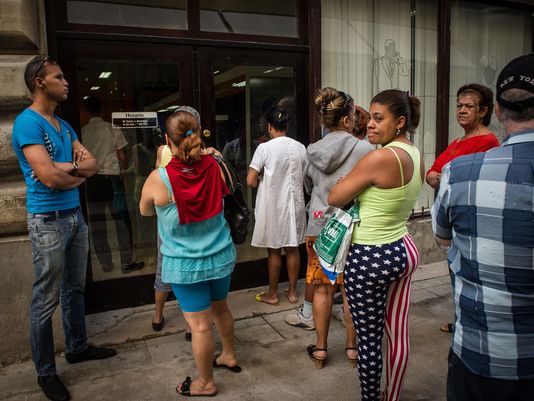
The line outside the Internet cafe in the Miramar neighborhood of this city forms early each day with patrons waiting up to two hours for a chance to send e-mails, chat online or update their Facebook page. The service may be slow, unreliable and expensive, but still they come.
“I need to keep up,” said Carlos Lopez, 71, who rents out rooms in his home to tourists and checks his e-mail twice a month for reservation requests. “I don’t have Internet at home, so I have no choice.”
The topics of improving telecommunications on the island and connecting more Cubans to the Internet — major tenets of the USA’s diplomatic strategy here — were discussed this week during high-level talks between the U.S. and Cuban government in Havana.
On Friday, Assistant Secretary of State Roberta Jacobson visited the offices of independent blogger and journalist Yoani Sánchez, a pioneer when it comes to using the Internet as a form of expression in Cuba.
“This is a critical part of our new policy,” Jacobson said about telecom improvements on the island. “Access and the ability for Cubans to get information is really, critically important.”
Josefina Vidal, the Cuban diplomat who has been Jacobson’s counterpart in the talks, said the Cuban government is willing to meet with U.S. firms to discuss improving their telecommunications network.
“We confirmed (during the talks) we’re ready to receive U.S. telecom companies to explore business opportunities — business that could be of benefit to both sides,” she told reporters this week.
How soon and how far-reaching changes will be to Cuban’s telecom network remains to be seen. Just 5% of Cuba’s 11 million residents have access to the Internet — one of the lowest rates in the hemisphere. Cuba’s state telecom company, ETECSA, maintains a monopoly on Internet service.
Two years ago, more than 100 cyber cafes opened across the island, but connections remain frustratingly slow and expensive. An hour of internet service costs around $5 — equal to a week’s salary of an average Cuban.
Even more enticing to Cubans is the prospect of web and e-mail access on smartphones, currently unavailable to island residents.
Alejandro Robaina Cardoso, owner of Havana’s La Casa paladar, or privately-run restaurant, said allowing Internet access on smartphones would boost his business. Tourists visiting his eatery often request Wi-Fi, which he doesn’t have. Cardoso owns a Samsung Galaxy smartphone but can only use it to make and receive calls since the other features are not possible in Cuba.
A few years ago, Cardoso hired a social media manager to keep his restaurant updated on sites such as TripAdvisor.com and Facebook and to run a blog. But until Cuba’s technology catches up, his business will suffer, he said.
“We are like in another world, like in the time of the dinosaurs,” Cardoso said. “That has to change. Everyone’s waiting for it.”
The Cuban government will need to loosen reams of rules and restrictions to implement an effective telecommunications network, said Ted Henken, a Baruch College Latino studies professor and longtime Cuban author and scholar. Cuban officials will have to decide how much access to the world they will allow their citizens and how fast they want to move in that direction, he said.
The Obama administration “is eliminating as many obstacles to the Internet, to commerce, to all the rest as fast as it can,” he said. “The onus is now on the Cuban government to respond to the demands of the Cuban people.”
Across Havana, Cubans followed news of this week’s U.S.-Cuba meetings closely for signs that their Internet connectivity could soon improve. Joana Ramirez, 28, a Havana waitress, has to catch rides to a cyber café then wait in line to check her e-mail. She said she hopes improved relations with the U.S. will soon change that.
“The people of Cuba want change,” she said. “A lot of people don’t have computers, don’t have Internet. It’s a big problem.”
USA Today

Leave a Reply
You must be logged in to post a comment.